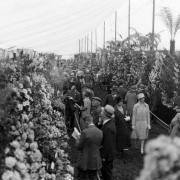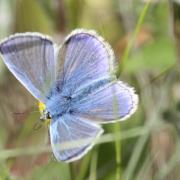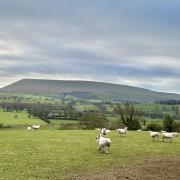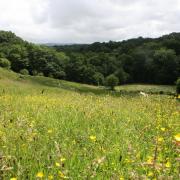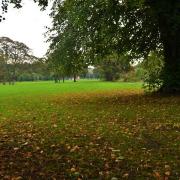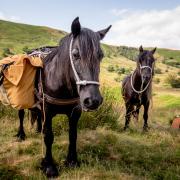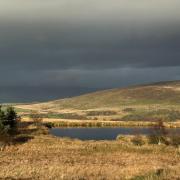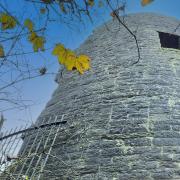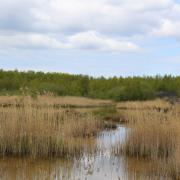Lakeland farmers are fighting to preserve a way of life and the future of the fell ponies which have helped shape a special landscape.

Like his beloved hill-bred fell ponies, Bill Potter believes he is one of a dying breed. The octogenarian farmer, who still sleeps in the bedroom in which he was born, has spent his whole life battling to preserve the lifestyle which makes the rare and threatened ponies unique.
But he fears he, and the hardy ponies, have become the victim of the Government’s commitment to re-wilding the fells.
Bill, and his brother Ted, fell in love with fell ponies while growing up on Stoney Ghyll Farm, nestled in a fold in the fells between Shap and Penrith, which has been in the family for around 100 years.
Originally the fell ponies were working animals, before they had any tractors. Now they are an add-on to their sheep farming. Under new proposals by Natural England, known as the Upper Level Stewardship Scheme, livestock would have to be taken off the fells for several months of the year.

‘They want to leave us just a couple of months in the winter and a couple of months in the spring to let the ponies roam the fells,’ says Bill. ‘It is the time on the fells which make the ponies what they are, hardy and hefted to the area.
‘What am I supposed to do with them during the rest of the year? Lock them up in stables? It’s a real headache. There won’t be any ponies left on the fells in another five years.’
He is also worried that large parts of the fells, where he lets the ponies roam free, are being fenced off to allow bushes to grow.
‘They are taking 80 hectares of Birkbeck Common for these bushes. It is not even for decent trees. They want to plant Mountain Ash and Hawthorn for the birds. I fear that the days of the fell ponies may be over,’ adds Bill, who will turn 81 in July.

Although Mr Potter says fell ponies are more of a hobby, he has sold animals as far as Germany and America for prices ranging between £100 and £1,500.
He and his brother Ted were registered keepers from 1972, long before Birkbeck Common had its Site of Special Scientific interest designation in 1988. But the Potters are not alone in their fight.
Libby Robinson, who is planning to set up a Fell Pony Heritage Centre in nearby Tebay, has mounted a petition to the Department for the Environment, Farming and Rural Affairs, of which Natural England is an agent.
‘I am putting together as much information as I can to send to DEFRA,’ she says. ‘The fell ponies need a voice in the debate.
‘Because of the money coming in to landowners for environmental projects, for the so-called public good, huge swathes of the uplands are going to be fenced off. The ponies need rough course grass and large areas to roam to survive.
‘If we take away their hefted grounds, their knowledge of the area, passed on from mares to their foals, will go. The characteristics which make the breed special will then be gone forever. Taking away the large grazing animals would be stopping the bio-diversity of the fells.’
Mrs Robinson says there are just 10 breeders of fell ponies and just 6,500 of the animals left in the world. They have been listed as endangered by the Rare Breeds Survival Trust.
Upland farmers across Britain are taking up the fight against re-wilding, too. At a lively Federation of Cumbria Commoners meeting at Newton Rigg College, Penrith, back in March, representatives from anti-rewilding group Mid Wales Comite des Organizations Professionelles Agricoles (COPA), said farmers had to stand up for their hefted farming community before DEFRA ‘sweeps it away’.
Mrs Robinson’s petition says DEFRA and Natural England’s policies in Cumbria farming stewardship schemes are diminishing the likelihood of the rare hill-bred fell pony having a future in its native environment.
‘There are not many breeding mares left on the upland fells, about 200 in total found in small groups of 15 to 20 ponies hefted to an area that can cover hundreds of acres,’ she says.
‘This life supports the breed’s great strength and stamina, running semi-wild all the year round. Foals brought up in a herd environment learn social and survival skills. Britain’s hardy mountain ponies graze in a way that can preserve the landscape and the subtle balance between plant and animal communities.’
It is an irony not lost on the farmers that The Lake District gained World Heritage Site Status from the United Nations for its man-made landscape, crafted by hardy breeds of sheep like Herdwicks, fell ponies and cattle.
And Julia Aglionby, executive director of the Foundation for Common Land, adds: ‘People come to the Lake District because they like to see traditional farming systems. If we allow that to be destroyed it would be a very different environment.
‘We are very concerned at the way Natural England is going about what they do. They are asking for significant reductions in stock levels, and show a lack of appreciation and respect for the range of benefits that commoners contribute to the landscape.
‘It is true that bio-diversity is in trouble, but they are not taking into account the community and the part farmers play in the process of protecting the natural environment.
‘In order to access grants and charitable donations to encourage re-wilding, some landowners are excluding the farmers from the process and favouring other priorities.’
Over the next four years, Upper Level Stewardship schemes covering around half of the Lake District come up for renewal. These agreements will only last for a year at a time due to uncertainty over Brexit.
‘A significant area of the Lake District is at risk. If we don’t get these roll-overs right and people seek to disengage the farming communities from the process, there is a risk that farmers will refuse to accept them and try to farm without this money,’ Julia adds.
A Natural England spokesperson said: ‘Fell ponies are an important part of the cultural heritage of the area and we are supportive of the conservation benefits they can bring through appropriate grazing. We will continue to work with farmers to achieve more sustainable grazing and avoid practices, such as year-round heavy grazing, that may be detrimental to protected habitats.’




